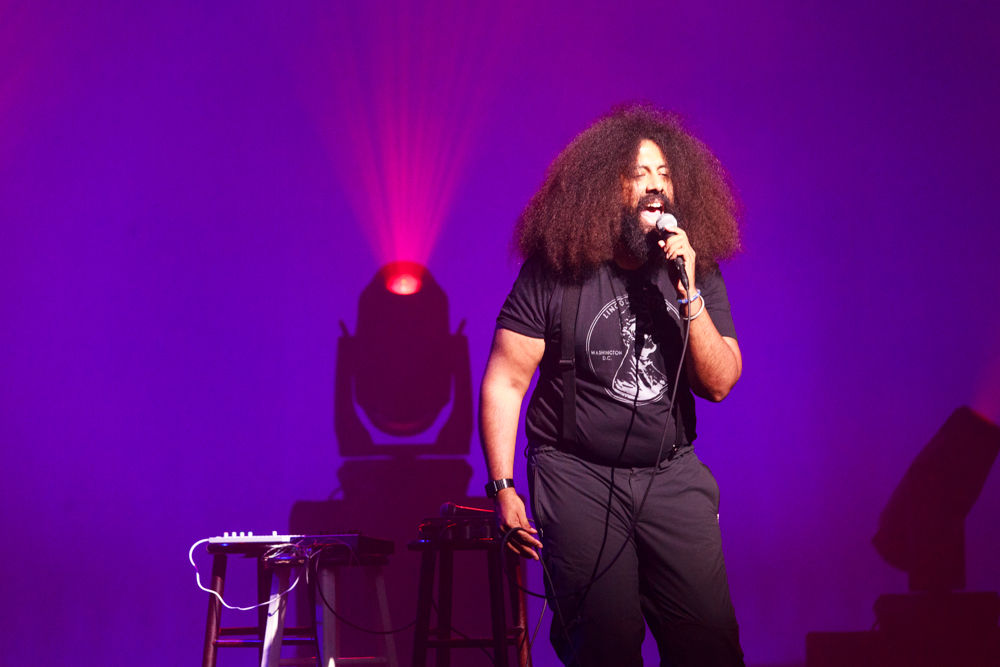
Comedian Reggie Watts performs as the headliner for the NextNOW Festival at the Clarice on Friday, September 11, 2015.
Reggie Watts took the stage in Kay Theatre and launched a philosophical analysis of the futility and overarching timelessness of obscure art. Or he made some jokes about Bach.
“I prefer to call him ‘it,’” he said.
That was the height of cohesion as the jokes and songs devolved into a tumult of sounds, accents and disjointed phrases.
But man, was it funny.
Watts crashed the opening set before taking the stage himself. One-man band Elie Rizk stomped out originals and smoky covers with chanteuse Sarah Lee and funny-guy guitarist Philip Peker before Watts cannonballed by the trio, who were quite parched and sweaty under mom-woven sweaters, with water.
His official entrance was less dramatic; he strode without much ado before introducing us to his first work — a Bach concerto (or fugue, depending on which end of his sentence you paid attention to) from the 1700s to 1400s (in that order) that was “the least popular thing,” because “that’s what this festival is about.” He proceeded to quite languidly mime playing an instrument before starting to intone some Gregorian-chant-like nonsense.
Confused? Good. So were we.
The act proceeded in that spectacularly silly fashion as Watts slipped in and out of personas, songs, monologues and pantomimes so effortlessly, reality itself seemed to shimmer.
“That’s what school’s about — being cool,” Watts said as he set up one of his performance’s more stand-up-like sessions. “You get the stickers — obviously. You get the Trapper Keeper. You get your backpack and wear it non-ergonomically.”
It was an effective and tickling bit of nostalgia that ended with Watt mock-chastising those covertly trying to use their phones while also looking up and unwittingly laughing at the jokes they missed. This, by the way, ended with a disturbingly lifelike impression of carrier pigeons, Watts’ apparent go-to mode of communication back in the day.
Keenly observant, he connected with audience members while disconnecting their ideas about normality. He called on audience members to answer questions about Fear The Walking Dead, the word “bae,” and what he called “selflies.” He assured us he’d incorporate references to our favorite shows and actors, like Baretta and Fred Astaire, but never did. He descended into the throng — wild hair floating along with him — to stroke the heads and faces of bewildered spectators. He even sought our pop-culture knowledge — “That new Daredevil show … what is it?” he asked — before doling out some nebulous philosophical quandaries — “How many thought it would happen to you?”
And of course, no Reggie Watts performance would be complete without expert soundsmithing. Watts and his electronic tools shamed leagues of producers, sound mixers and audio engineers as he oscillated among genres and cultures. Military march became Jamaican reggae, which became French trap, which became something I can only describe as vaguely Russian and very fast.
The man spot-engineered four or five songs that, dissected and transplanted, could’ve been transformed to full-length radio hits if only they had actual words.
When the songs made sense lyrically, they didn’t logically. Watts whispered a song about being sorry, crooned about a hound dog and pondered existence.
“You exist in all points in time,” he half-sang, half-said.
“You’ve already got [a future] now — NextNOW,” he said before making the whole audience sing “NextNOW.”
Unafraid of social commentary, Watts jested about white actors voicing over cartoon characters of color and Donald Trump’s grasp on women.
Even 9/11 got a little Watts treatment, as he reflected on a trip to Williamsburg, Brooklyn, when he came upon a fire truck that said “Never forget.” It provoked a profound realization, he said.
“And I was like, ‘F—, I do not have my wallet,’” he recalled.
Finally, covering every base, he created a slogan for the University of Maryland as if it were a radio station.
“UMD, feel the f—!” he yelled, coaxing the audience to chant as well.
“I hope that catches on,” he mused.
It might not, but judging by the absurd glee palpable in an emptying Kay Theatre, Watts certainly will.
CORRECTION: Due to a reporting error, the story identified one of the opening performers as Hannah Lee. Her name is Sarah Lee. The article has been updated.



